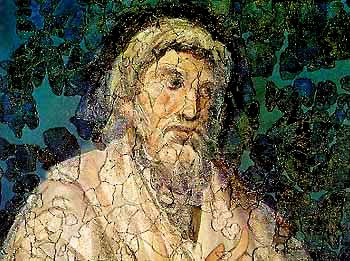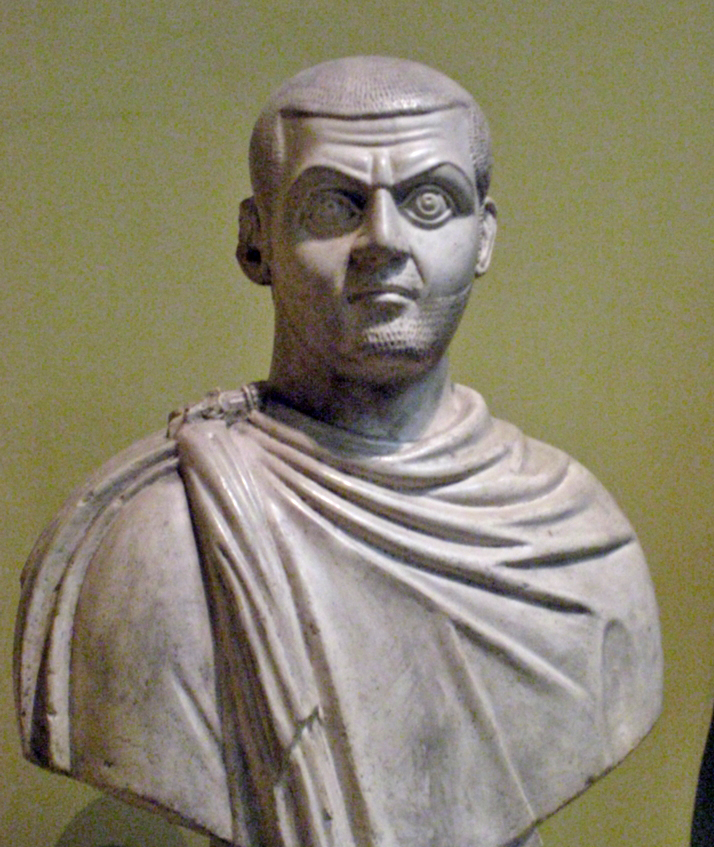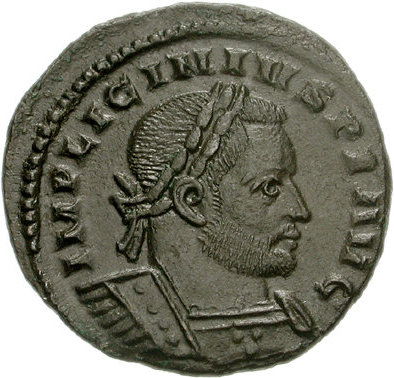|
Candidianus (son Of Galerius)
Candidianus (c. 296–313) was the son of the Roman Emperor Galerius and adoptive son of Galeria Valeria, the wife of Galerius and daughter of Diocletian. Life and execution Candidianus was the son of Galerius and a concubine whose name has not been recorded. He was later adopted by Galerius's legitimate wife, Galeria Valeria, who had no children of her own. Lactantius records that Galerius intended to make Candidianus a Caesar, or junior emperor, upon the celebration of his vicennalia in 312. However, Galerius perished in 311 while preparations for the celebration were underway and was succeeded by Maximinus Daza and Licinius. Along with Severianus, son of the deceased emperor Severus II Flavius Valerius Severus (died September 307), also called Severus II, was a Roman emperor from 306 to 307. After failing to besiege Rome, he fled to Ravenna. It is thought that he was killed there or executed near Rome. Background and early ..., Candidianus feared the intentions of Lici ... [...More Info...] [...Related Items...] OR: [Wikipedia] [Google] [Baidu] |
Galerius
Gaius Galerius Valerius Maximianus (; 258 – May 311) was Roman emperor from 305 to 311. During his reign he campaigned, aided by Diocletian, against the Sasanian Empire, sacking their capital Ctesiphon in 299. He also campaigned across the Danube against the Carpi, defeating them in 297 and 300. Although he was a staunch opponent of Christianity, Galerius ended the Diocletianic Persecution when he issued an Edict of Toleration in Serdica in 311. Early life Galerius was born near Serdica, in Dacia Ripensis, later named Dacia Mediterranea, though some modern scholars consider the strategic site where he later built his palace named after his mother – Felix Romuliana ( Gamzigrad) – his birth and funeral place.Barnes, ''New Empire'', p. 37. His father was a Thracian and his mother Romula had left Roman Dacia because of the Carpians' attacks. He originally followed his father's occupation, that of a herdsman, where he was nicknamed "Armentarius", herdsman ( la, armentum, lit= ... [...More Info...] [...Related Items...] OR: [Wikipedia] [Google] [Baidu] |
Galeria Valeria
Galeria Valeria (died 315) was the daughter of Roman Emperor Diocletian and wife of his co-emperor Galerius. Biography Born as Valeria to Diocletian and Prisca, she married Galerius in 293, when her father elevated him to the position of Caesar. This marriage was clearly organized to strengthen the bonds between the two emperors. Valeria was raised to the title of Augusta and ''Mater Castrorum'' in November 308. Since Galerius fathered no child with her, Valeria adopted her husband's illegitimate son, Candidianus, as her own. In her honor, Galerius renamed the province of Upper Pannonia ''Valeria'', which he had improved by draining marshes and removing forests. When Galerius died, in 311, Licinius was entrusted with the care of Valeria and her mother Prisca. The two women, however, fled from Licinius to Maximinus Daia, whose daughter was betrothed to Candidianus. After a short time, Valeria refused the marriage proposal of Maximinus, who arrested and confined her in Syria a ... [...More Info...] [...Related Items...] OR: [Wikipedia] [Google] [Baidu] |
Diocletian
Diocletian (; la, Gaius Aurelius Valerius Diocletianus, grc, Διοκλητιανός, Diokletianós; c. 242/245 – 311/312), nicknamed ''Iovius'', was Roman emperor from 284 until his abdication in 305. He was born Gaius Valerius Diocles to a family of low status in the Roman province of Dalmatia. Diocles rose through the ranks of the military early in his career, eventually becoming a cavalry commander for the army of Emperor Carus. After the deaths of Carus and his son Numerian on a campaign in Persia, Diocles was proclaimed emperor by the troops, taking the name Diocletianus. The title was also claimed by Carus's surviving son, Carinus, but Diocletian defeated him in the Battle of the Margus. Diocletian's reign stabilized the empire and ended the Crisis of the Third Century. He appointed fellow officer Maximian as ''Augustus'', co-emperor, in 286. Diocletian reigned in the Eastern Empire, and Maximian reigned in the Western Empire. Diocletian delegated further on ... [...More Info...] [...Related Items...] OR: [Wikipedia] [Google] [Baidu] |
Lactantius
Lucius Caecilius Firmianus Lactantius (c. 250 – c. 325) was an early Christian author who became an advisor to Roman emperor, Constantine I, guiding his Christian religious policy in its initial stages of emergence, and a tutor to his son Crispus. His most important work is the ''Institutiones Divinae'' ("The Divine Institutes"), an apologetic treatise intended to establish the reasonableness and truth of Christianity to pagan critics. He is best known for his apologetic works, widely read during the Renaissance by humanists, who called Lactantius the "Christian Cicero". Also often attributed to Lactantius is the poem '' The Phoenix'', which is based on the myth of the phoenix from Egypt and Arabia. Though the poem is not clearly Christian in its motifs, modern scholars have found some literary evidence in the text to suggest the author had a Christian interpretation of the eastern myth as a symbol of resurrection. Biography Lactantius was of Punic or Berber origin, born in ... [...More Info...] [...Related Items...] OR: [Wikipedia] [Google] [Baidu] |
Maximinus Daza
Galerius Valerius Maximinus, born as Daza (20 November 270 – July 313), was Roman emperor from 310 to 313 CE. He became embroiled in the Civil wars of the Tetrarchy between rival claimants for control of the empire, in which he was defeated by Licinius. A committed pagan, he engaged in one of the last persecutions of Christians, before issuing an edict of tolerance near his death. Name The emperor Maximinus was originally called Daza, a common name in Illyria, where he was born. The form "Daia" given by the Christian pamphleteer Lactantius, an important source on the emperor's life, is considered a misspelling and deprecated. He acquired the name Maximinus at the request of his maternal uncle, Galerius, and his full name as emperor was Galerius Valerius Maximinus. Modern scholarship often refers to him as Maximinus Daza, though this particular form is not attested by epigraphic or literary evidence. Early career He was born in the Roman Illyria region to the sister of em ... [...More Info...] [...Related Items...] OR: [Wikipedia] [Google] [Baidu] |
Licinius
Valerius Licinianus Licinius (c. 265 – 325) was Roman emperor from 308 to 324. For most of his reign he was the colleague and rival of Constantine I, with whom he co-authored the Edict of Milan, AD 313, that granted official toleration to Christians in the Roman Empire. He was finally defeated at the Battle of Chrysopolis (AD 324), and was later executed on the orders of Constantine I. Early reign Born to a Dacian peasant family in Moesia Superior, Licinius accompanied his close childhood friend, the future emperor Galerius, on the Persian expedition in 298. He was trusted enough by Galerius that in 307 he was sent as an envoy to Maxentius in Italy to attempt to reach some agreement about the latter's illegitimate political position. Galerius then trusted the eastern provinces to Licinius when he went to deal with Maxentius personally after the death of Severus II. Upon his return to the east Galerius elevated Licinius to the rank of ''Augustus'' in the West on 11 Novem ... [...More Info...] [...Related Items...] OR: [Wikipedia] [Google] [Baidu] |
Flavius Severianus
Flavius Severianus (died 313) was the son of the Roman Emperor Flavius Valerius Severus. Life and execution After his father died in 307 in Italy having surrendered to his rivals Maximian and Maxentius, Severus' young son Flavius Severianus sought refuge in the Eastern part of the empire under Galerius. When Galerius died in 311, Severianus suspected that Licinius intended to do him harm as a potential rival in his ambitions to rule the East and so he fled to Maximinus Daza in Asia who made him ''praeses'' (governor) of the province of Isauria. In August 313 Maximinus Daza went to war against Licinius. Severianus accompanied him on this campaign which ended in defeat for Daza. Severianus was captured following the death of Daza, and Licinius had him executed under the pretense that Severianus intended to assume the imperial office himself. [...More Info...] [...Related Items...] OR: [Wikipedia] [Google] [Baidu] |
Severus II
Flavius Valerius Severus (died September 307), also called Severus II, was a Roman emperor from 306 to 307. After failing to besiege Rome, he fled to Ravenna. It is thought that he was killed there or executed near Rome. Background and early career Severus was of humble birth, born in Northern Illyria around the middle of the third century. A friend of emperor Galerius, he rose to become a senior officer in the Roman army, being nominated as ''caesar'' of the Western Roman Empire. According to Lactantius, Diocletian objected to Galerius's suggestion, saying in response, "What! That dancer, that habitual drunkard who turns night into day and day into night?" Galerius persisted, saying that Severus has served faithfully as paymaster and purveyor of the army.Lactantius (4th century). Lord Hailes (transl.) (2021) On the Deaths of the Persecutors'. Evolution Publishing, Merchantville, NJ , pp. 31-47 Diocletian acquiesced and Severus succeeded to the post of ''caesar'' on 1 May 305 ... [...More Info...] [...Related Items...] OR: [Wikipedia] [Google] [Baidu] |
313 Deaths
__NOTOC__ Year 313 ( CCCXIII) was a common year starting on Thursday (link will display the full calendar) of the Julian calendar. At the time, it was known as the Year of the Consulship of Constantinus and Licinianus (or, less frequently, year 1066 '' Ab urbe condita''). The denomination 313 for this year has been used since the early medieval period, when the Anno Domini calendar era became the prevalent method in Europe for naming years. This year is notable for ending of the persecution of Christians in the Roman Empire. Events By place Roman Empire * At the end of 312 or in early 313, the retired Emperor Diocletian dies in his palace in Split, most likely from natural causes. * February: Emperors Constantine I and Licinius convene in Mediolanum (modern Milan). Licinius marries Constantine's half-sister Constantia, and they issue the Edict of Milan. This edict ends the Great Persecution against the Christians and is the first piece of legislation in western his ... [...More Info...] [...Related Items...] OR: [Wikipedia] [Google] [Baidu] |
4th-century Romans
The 4th century (per the Julian calendar and Anno Domini/Common era) was the time period which lasted from 301 ( CCCI) through 400 ( CD). In the West, the early part of the century was shaped by Constantine the Great, who became the first Roman emperor to adopt Christianity. Gaining sole reign of the empire, he is also noted for re-establishing a single imperial capital, choosing the site of ancient Byzantium in 330 (over the current capitals, which had effectively been changed by Diocletian's reforms to Milan in the West, and Nicomedeia in the East) to build the city soon called Nova Roma (New Rome); it was later renamed Constantinople in his honor. The last emperor to control both the eastern and western halves of the empire was Theodosius I. As the century progressed after his death, it became increasingly apparent that the empire had changed in many ways since the time of Augustus. The two emperor system originally established by Diocletian in the previous century fell in ... [...More Info...] [...Related Items...] OR: [Wikipedia] [Google] [Baidu] |
People Executed By The Roman Empire
A person ( : people) is a being that has certain capacities or attributes such as reason, morality, consciousness or self-consciousness, and being a part of a culturally established form of social relations such as kinship, ownership of property, or legal responsibility. The defining features of personhood and, consequently, what makes a person count as a person, differ widely among cultures and contexts. In addition to the question of personhood, of what makes a being count as a person to begin with, there are further questions about personal identity and self: both about what makes any particular person that particular person instead of another, and about what makes a person at one time the same person as they were or will be at another time despite any intervening changes. The plural form "people" is often used to refer to an entire nation or ethnic group (as in "a people"), and this was the original meaning of the word; it subsequently acquired its use as a plural form of per ... [...More Info...] [...Related Items...] OR: [Wikipedia] [Google] [Baidu] |
Executed Ancient Roman People
Capital punishment, also known as the death penalty, is the state-sanctioned practice of deliberately killing a person as a punishment for an actual or supposed crime, usually following an authorized, rule-governed process to conclude that the person is responsible for violating norms that warrant said punishment. The sentence ordering that an offender is to be punished in such a manner is known as a death sentence, and the act of carrying out the sentence is known as an execution. A prisoner who has been sentenced to death and awaits execution is ''condemned'' and is commonly referred to as being "on death row". Crimes that are punishable by death are known as ''capital crimes'', ''capital offences'', or ''capital felonies'', and vary depending on the jurisdiction, but commonly include serious crimes against the person, such as murder, mass murder, aggravated cases of rape (often including child sexual abuse), terrorism, aircraft hijacking, war crimes, crimes against hum ... [...More Info...] [...Related Items...] OR: [Wikipedia] [Google] [Baidu] |
_-_Foto_G._Dall'Orto_28-5-2006.jpg)





_1938.jpg)
